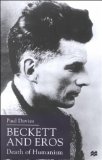

 |

|

The average rating for Beckett and Eros: Death of Humanism based on 2 reviews is 3 stars.
Review # 1 was written on 2015-12-07 00:00:00 James Allen James AllenIn Surrealism: The Road to the Absolute, Anna Balakian continues her study of surrealist literature, setting up the analyzation in three parts: the signal lights, the road, and the bend in the road. Most of what is written in the first two sections are simply sequels to the authors first book, 'Literary Origins of Surrealism' which I also read. The author once again devotes a chapter to the comte de Lautréamont, this time focusing her attention on Ducase's fixation with scientific theory at the time, including religion and ideologies involving God. Guillaume Apollinaire is then discussed for the first time, focusing attention on his influence over the surrealists and the eventual cause and effect relationship signified by Apollinaire and modern poetry of to-day. The first section finishes up by discussing Pierre Reverdy, the French poet whose works were subsequently influenced by Surrealism, Dadaism, and Cubism. Both of the latter authors are not mentioned in Balakian's first book, something the author must undoubtedly regret, due to Reverdy's association with the mystical, as 'Literary Origins of Surrealism' emphasized the "new mysticism in French poetry" in the twentieth century. The chapters which follow the first section dedicate themselves to André Breton and the Surrealistic movement, something that is discussed at great length in Literary Origins of Surrealism. Unfortunately, not much can be gathered from the reading of these chapters alone, for these capture more of an "extension" of the work analyzed in the first book. These chapters are dry without any prior knowledge of the subject studied in Literary Origins of Surrealism. Freudian influence, verbal reconstruction, the creation of a series of images in poetry, contradictions, and the surrealist image, are examined, but again, lacking any prior knowledge of the Surrealist movement as a whole makes this section of the book seem forced and lackadaisical. The last section entitled 'the bend in the road' is the only clear evidence the author actually met with and interviewed Breton and Reverdy, as mentioned in the foreword to the book. It begins by introducing Louis Aragon and Paul Éluard, two significant French poets that were a definitive branch of the surrealistic family tree-- and are hardly mentioned in much of Surrealistic history-- carrying on the movement in the shaping of post-surrealism. If surrealism had just been a means of expressing youthful revolt and rejection, once could be persuaded by Aragon's assertion: "I have never been a part of a school." Aragon had defined surrealism as "the unruly and ardent use of the stupefying image" which, he believed, continually revised out entire universe. The dominant characteristic of Eluard in his earliest surrealistic poetry was the love theme. It inspired him once to say, despite all the hatred about him: "I love for the sake of loving and I shall die of love." Their post-surrealism was an evolution of surrealism rather than a change: increasing consciousness of the social message of the poet; and with this feeling there arouse an increasing wish to communicate with a public, which implies a modification of their use of language. Aragon's belief in the conjuration of words is in the tradition of Baudelaire and of the linguistic doctrines of the surrealists: that writing should be a magical operation capable of producing enchantment. The surrealists discovered that without social revolution there could not be a surrealist revolution. But Breton, as well as many of his colleagues and disciples, soon realized that their poetic image of "revolution" was in direct contradiction with the limited sense given the word by the communists. And it is not until some years later that Aragon went as far as to declare that all his work as an artist had to be henceforth subjugated to the communist dream. For this reason and this reason alone, many artists such as myself steer in the opposite direction of Aragon's work in the movement, hoping that he would have had a change of heart in these statements. Eluard on the other hand, dreamt of a "paradise on earth" in which it would be the poet's function to prove himself "more useful than any other citizen of the tribe." Both artists however cannot be denied their surrealistic imprint. One of the most significant aspects of the surrealistic movement as a lifestyle is that André Breton has had to keep the vow of poverty, as a priest of the church of surrealism, although he has lived to see lesser writers than himself win great public acclaim. Breton lived his life with no regrets. He has exemplified not the pure but the total poet, clarifying to a greater degree than anyone in his time, what the position of a poet can be in a society: not to seek to please and be admired, but to know and communicate knowledge. To-day surrealism does not need to prove its authenticity, for science has followed a parallel path of inquiry, further proving the poet's hypothesis of challenging man's utmost imaginative resources. Thus, the endeavors of the scientist and the artist are closely linked-- not more than the surrealists could have ever imagined, for the surrealistic movement proved to place imagination in the trust and care of man's outermost limitations on knowledge. Anna Balakian's prodigious knowledge pertaining to André Breton as a leader and artist of the Surrealistic movement has actually convinced me to read her biography of Breton as my next book... |
Review # 2 was written on 2012-08-10 00:00:00 Chi-chung Chang Chi-chung ChangThis is the second time I've read this book. I forgot what a dense and intricate examination it is on the literary influences of the impregnation of Surrealism. Balakian also makes clear the difference between Dada and Surrealism: "for Dada was bent on destruction, surrealism was in search of the power of creation." |
CAN'T FIND WHAT YOU'RE LOOKING FOR? CLICK HERE!!!